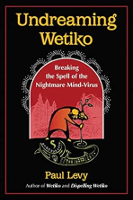
Image by Avi Chomotovski
I’d like to introduce the term nightmare mind-virus as a synonym for wetiko. This coinage feels right, as it captures an aspect of this virus of the mind that adds to and complements the name wetiko. The nightmare mind-virus is the deviant psychic factor that’s at the bottom of our unconscious creation of a real-life nightmare in our world. Finding the name for what is afflicting us is like a deliverance from a nightmare.
I like how the word nightmare refers to and implies dreaming. Nightmares are an unmediated expression and symbol of the darker and unintegrated parts of our unconscious having their way with us. This is precisely what the nightmare mind-virus of wetiko does when it gains the upper hand in our psyche and in our world, and runs amok. By teaching us how nightmares work, the nightmare mind-virus can potentially empower us to transform and stop dreaming up the nightmare we are living through.
Multidimensional phenomena like wetiko have inspired many names throughout history, yet any one name can’t possibly capture all of its multiple aspects. And so to find the name for this parasite of the mind that we are dealing with is important, for it helps us get a handle on it and how it operates.
A Counterfeit Version of Who We Really Are
Our true nature, our true identity—who we really are—is impervious to wetiko’s pernicious influence. Wetiko can’t take over, possess, or have any effect on our true nature, which is not an object that can be possessed by wetiko or by anything else, for that matter. For this reason, wetiko’s strategy is to set up a counterfeit version—a simulation—of who we are, which it then tricks us into identifying with. Wetiko can’t stand it when we identify with our true nature, as it then has nothing to sink its fangs into. Wetiko has no creativity on its own, but is a master impersonator—we can conceive of it as aping the Divine.
The Apocryphon of John calls wetiko “the counterfeiting spirit” (the antimimon pneuma [Apoc.John III, 36:17]). A master mime, wetiko literally masquerades as ourselves. This counterfeiter plugs into our own innate creativity in order to conjure up a stunted image of oneself as limited, wounded, and beset with all kinds of problems (or the opposite, as inflated and grandiose). This psychic snake-oil salesman then compellingly tells us that this fraudulent representation is who we actually are.
If we are not awake in the moment to this fraud, we will be sold a bogus bill of goods; like putting on a garment, we will unknowingly step into—buy into—wetiko’s fabricated and impoverished version of who we are. In so doing, in one fell swoop we have given ourselves away, identified with who we are not and have thus disconnected from our creative power.
Identifying with the False Self
As soon as we identify with this false self we are a goner, as then, with wetiko’s help, we will create experiences that confirm this limited identity in a self-reinforcing, mind-created feedback loop. Wetiko has then fooled us into thinking that a seeming appearance, a display of our mind, a fictitious identity that has no actual reality, is the real deal. We can then be consumed by protecting and defending a make-believe version of who we are that doesn’t even exist. We have then stepped out of our right mind and have identified with the mind that wetiko has crafted for us, unknowingly becoming its hand puppet.
Behind the scenes, wetiko is manipulating us by pulling our strings, as if we are its marionette, so as to reinforce what it wants us to think instead of us thinking for ourselves. We will then be deposed from the kingdom, from the sovereign position that rightfully belongs to us as part of our inheritance. As sci-fi author Philip K. Dick would say, a usurper has assumed the throne.
Surprisingly (or I should say, not surprisingly), any mention of such a counterfeiting spirit was removed from the biblical canon and can only be found in the apocryphal texts—a maneuver that I would venture was inspired by wetiko. Because the Apocrypha are not included in the Bible, its sayings are often thought to be of spurious origin, but the opposite is actually the case: at the time of their writing these texts were accorded the highest respect and veneration. It is as if wetiko itself was on the editorial board of the Bible, doing its damndest to make sure it wouldn’t be exposed. And yet in so doing, wetiko reveals one of its main strategies: it does everything it can to avoid being seen, for once it is recognized its cover is blown and its power is then taken away.
The Blessing of a Powerful Dream
A few years ago I had a powerful dream that is relevant to this discussion. In waking life, one of my primary teachers, a Tibetan lama, a truly awakened person who at this time I had known for over thirty-five years and had great love and devotion for, was visiting me for the week.
I had offered him my house, and he was sleeping in my bedroom, in my bed. He had just left that day, and this was the first night that I was back sleeping in my own bed. I say this because after having this dream I was left with the feeling that it wasn’t unrelated to my teacher’s energy permeating my sleeping and dreaming quarters (at least in my imagination). Upon reflection, the dream feels like a form of his blessings, as if he had left me a gift chocolate on my pillow.
In the dream I stumbled upon an inner sanctum that was inhabited by a group of hobgoblin-type entities. These gremlins seemed utterly shocked that I had found my way into their sanctuary, as if hardly anyone had ever discovered their secret abode before. These elflike creatures were not at all happy, to say the least, that I had discovered them.
Once they realized that I was seeing them in their element, they immediately shape-shifted and assumed a different form so as to conceal themselves. As the dream unfolded, I would then recognize them in their new disguise, and they would transform themselves again. This process continued a handful of times until I woke up.
Upon awakening I was left with the feeling that in the dream I was having a wetiko sighting, which is to say my unconscious—the dreamer of my dreams—had objectified for me these most elusive, hard-to-see energies. As I processed the dream, I sensed that these mischievous entities didn’t exist solely in my own mind, but that they existed deep down in everyone else’s mind too.
It was as if I had somehow found access to a nonordinary shamanic realm of reality that wasn’t merely the product of my fevered imagination, but existed in its own right, with a reality all its own. There was a strange, uncanny sense I felt upon waking up that in seeing these creatures they now knew that I was on to them and would do everything in their power to make me lose their trail.
The feeling I came away with was that these entities were the “bugs” in the system that messed with our minds, whose job is to create havoc, chaos, and misunderstandings galore. And yet, once the darkness of chaos emerges, I’ve learned that magic isn’t far behind if we allow it to reveal itself. Like typical emissaries of wetiko, however, they literally can’t stand to be seen, as being seen not only takes away their power, it renders them into the ranks of the unemployed.
This brings to mind other dreams, visions, and insights I’ve had over the years, all having to do with seeing a hidden, subterranean, dark force that doesn’t want to be seen, and then trying (with varying degrees of success) to communicate what I’m seeing in a way that can be understood by other people. My whole body of work over the last quarter of a century or more can be conceived in this way. Over the years I’ve hopefully become more creative and fluent in my ability to describe these obscuring forces.
A Revelation of the Highest Order
As I’ve deepened my study of wetiko, in addition to understanding the destructive aspect of this mind-virus I’ve begun to realize that it is an extremely unusual yet important form of revelation—the inverse of a revelation from on high, it is a revelation that is emerging through the darkness.
I would like to suggest that our experience of feeling stuck, of seemingly having fallen prey to wetiko, has encoded within it a revelation of the highest order, having to do with discovering who we really are. Though this state in which we feel stuck feels like a curse, it has hidden within it a very real blessing. For once we become conscious of our seemingly damned state, this insight changes everything, for one of wetiko’s favorite strategies is to make us think the problem is outside of us while in essence the real problem is our (mis)conception of who we are. Once we realize this, we can turn our attention inward, which is where the source—and the solution—of our problem is to be found.
There is a world of difference between subjectively experiencing that we are stuck and actually being stuck, which our true nature, which is naturally always free, can never be. We can potentially discover that part of us that feels stuck, the part that seems to be gripped by and struggles with wetiko, isn’t who we really are, but is a wetiko-inspired simulation of us, a stand-in for the real thing. To see through this very convincing illusion is a truly liberating experience that can introduce us to our authentic nature, which wetiko can’t touch because it is inherently and unconditionally free.
Ferreting Out Wetiko
Ferreting out wetiko is like coming across the very thing that is stopping us from attaining our true potential. Discovering the wetiko mind-virus is the requisite doorway that leads, as if uncovering a buried treasure, to the unearthing of something of tremendous value.
It will help a person’s life beyond measure to get wind of wetiko, but in the greater scheme of things if this realization only affects one person, the overall impact is fairly insignificant. However, when the discovery of wetiko is shared more widely and more and more people get turned on to it—and turned on by it—then it can easily go viral and change everything, and then some.
Copyright 2023. All Rights Reserved.
Adapted with permission.
Published by Inner Traditions Intl.
Article Source: Undreaming Wetiko
Undreaming Wetiko: Breaking the Spell of the Nightmare Mind-Virus
by Paul Levy
 The profound and radical Native American idea of “wetiko,” a virus of the mind, underlies the collective insanity and evil that is destructively playing out around the world. Yet, encoded within wetiko itself lies the very medicine needed to combat the mindvirus and heal both ourselves and our world.
The profound and radical Native American idea of “wetiko,” a virus of the mind, underlies the collective insanity and evil that is destructively playing out around the world. Yet, encoded within wetiko itself lies the very medicine needed to combat the mindvirus and heal both ourselves and our world.
Paul Levy begins by investigating how the process of becoming triggered, wounded, or falling into suffering can help us better understand the workings of wetiko in a way that transforms our struggles into opportunities for awakening. He highlights one of the primary archetypes currently activated in the collective unconscious of humanity—the wounded healer/shaman. Ultimately, the author reveals that the best protection and medicine for wetiko is to connect with the light of our true nature by becoming who we truly are.
For more info and/or to order this book, click here. Also available as a Kindle edition and Audiobook.
1644115662
About the Author
 Paul Levy is a pioneer in the field of spiritual emergence and a Tibetan Buddhist practitioner for more than 35 years. He has intimately studied with some of the greatest spiritual masters of Tibet and Burma. He was the coordinator of the Portland chapter of the PadmaSambhava Buddhist Center for over twenty years and is the founder of the Awakening in the Dream Community in Portland, Oregon.
Paul Levy is a pioneer in the field of spiritual emergence and a Tibetan Buddhist practitioner for more than 35 years. He has intimately studied with some of the greatest spiritual masters of Tibet and Burma. He was the coordinator of the Portland chapter of the PadmaSambhava Buddhist Center for over twenty years and is the founder of the Awakening in the Dream Community in Portland, Oregon.
He is the author of The Madness of George Bush: A Reflection of Our Collective Psychosis (2006), Dispelling Wetiko: Breaking the Curse of Evil (2013), Awakened by Darkness: When Evil Becomes Your Father (2015) and The Quantum Revelation: A Radical Synthesis of Science and Spirituality (2018), and more.
Visit his website at AwakeningheDream.com/



























